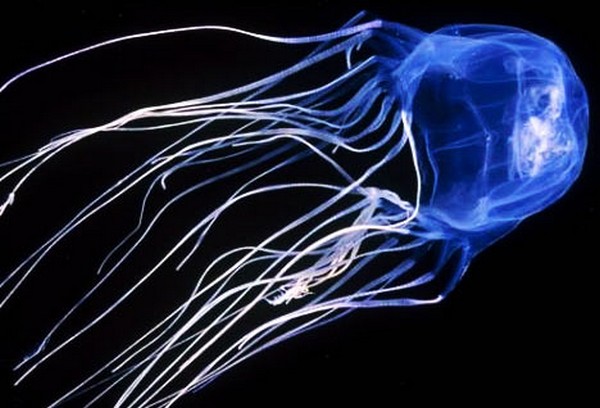Scientists Say Irukandji Jellyfish May Migrate South
 As surfers we're often told that the effects of climate change could have a direct impact on wave riding. The reason given is sea level rise; the combined effect of glacial melt and thermal expansion that will change how waves break on your favourite stretch of coast. However, it's not the only change that may effect us. Of particular interest to Queensland surfers is the potential southward migration of Irukandji jellyfish.
As surfers we're often told that the effects of climate change could have a direct impact on wave riding. The reason given is sea level rise; the combined effect of glacial melt and thermal expansion that will change how waves break on your favourite stretch of coast. However, it's not the only change that may effect us. Of particular interest to Queensland surfers is the potential southward migration of Irukandji jellyfish.
Irukandji are a type of box jellyfish, tiny in size they measure just a couple of centimetres across. They're also transparent making them near impossible to spot in the ocean. The sting of the Irukandji, while not normally fatal, leads to excruciating pain and muscle cramps. Other effects include a burning sensation of the skin, headaches, nausea, restlessness, sweating, vomiting, an increase in heart rate and blood pressure, plus psychological phenomena such as a feeling of impending doom. Collectively it's known as Irukandji Syndrome and can last for hours or weeks. Hospitalisation is almost always required.
At present the range of Irukandji jellyfish extends as far south as Fraser Island. However, over the next 50-100 years southeast Queensland waters are forecast to rise between 2 and 4 degrees. Even at the lower end this would ostensibly mean all Queensland waters are warm enough to sustain Irukandji. So for Queensland surfers the question begs: Can we expect an influx of Irukandji and other warm water tropical stingers into the Sunshine Coast and Gold Coast?
Professor Jamie Seymour is a toxinologist at James Cook University in Cairns. In 2010 he told the ABC that the annual Irukandji season was increasing. "30 or 40 years ago the length of the irukandji season was about a month to a month-and-a-half," said Prof Seymour. “The length of the season now is about five-and-a-half to six months."
The extended season allows the Irukandji to roam far wider than they previously have. "It’s just going to take a little bit of time, an increase in water temperatures [then] it’ll be a problem down in Surfers Paradise," warns Prof Seymour.
Dr Lisa-Ann Gershwin has been leading the research on Irukandji (at least she was until the Federal Government recently cut CSIRO funding and put her out of a job) and she believes it's possible though migration is not just a matter of warmer water hosting the jellyfish.
In 2007 the first Irukandji was spotted at Hervey Bay. Since then there's been a recent spate of Irukandji stings in waters further south than is there normal habitat. The last one was a young boy badly stung on New Year's Eve at Wellington Point inside Moreton Bay. “Whether that was a one-off, or a glimpse of things to come, is completely unknown. We simply don’t have the research.”
However, one thing that will allay the fears of surfers bracing for hordes of Irukandji is their physical structure: Irukandji are small, thin, and fragile, they can't survive in areas of high wave activity. This doesn't mean they won't migrate south, it just means such migration can only happen under certain conditions.
Last May, just prior to losing her job with CSIRO, Dr Gershwin released a report that forecast when Irukandji blooms may occur. The report states that Irukandji stings are more likely when there's an absence of trade winds. Dr Gershwin surmises that they may take up residence in sheltered areas to the south, such as Moreton Bay and the lee of the Stradbroke Islands, and wait until conditions are ideal – times of light winds and low wave activity – when they'll fan out. Suffering through a flat spell may take on a whole new meaning.
Dr Gershwin's forecast was devised with Queensland's tourist economy in mind. It can give lifeguards and councils up to a week's notice to shut beaches during times of high risk.
The news is both good and bad
Last year, PhD student Shannon Klein, working under Associate Professor Kylie Pitt from Griffith University, published a paper on the changing habitat of the Irukandji jellyfish due to expected climate change.
What the paper revealed is that Irukandji will tolerate all forecast increases in temperature off southeast Queensland, flourishing in both summer and winter conditions. An increase in the strength of the south-flowing East Australian Current may also facilitate the movement of adult Irukandji into higher latitudes.
However, countering the increased migration range is an expected rise in ocean acidification. That is, if climate change follows forecast models the world's oceans will become more acidic as they absorb carbon from the atmosphere. This acidification will slow the rate at which the Irukandji can procreate possibly keeping the Irukandji population at bay in the long term.
Interestingly, Shannon finds that in the short term – meaning the next few decades - if ocean temperatures rise and acidification lags there's a good possibility that Irukandji could inhabit the more southern waters of southeastern Queensland.
So it seems in the coming decades we could see an increase in venomous jellyfish and Irukandji across the Sunshine Coast and Gold Coast but longer-term their infiltration may be kept at bay. //CRAIG BROKENSHA with STU NETTLE
Special thanks to Dr Lisa-Ann Gershwin and Shannon Klein for their help.


Comments
It's an interesting read to see how Jack Barnes discovered the cause of Irukandji syndrome.
http://lifeinthefastlane.com/jack-barnes-and-the-irukandji-enigma/
Great story and ballsy to put himself to the test. Poor young kid having to cop it as well! Haha. Don't think that would float these days.
Awesome story, as is his middle name, Handyside.
I think "N.B' in the story is his son, no?
"The first Carybdeid was applied to an adult (J.B.), and to a boy, aged nine years (N.B.). A robust young life-saver (C.R.) volunteered to test the second specimen, of similar size to the first."
So dad felt some need to double check the sting of the first specimen on "someone" else too?
Here's a quote from Prof Jamie Seymour (quoted in article above) about the pain of Irukandji stings:
"I'd prefer to take a big Box Jellyfish sting any day of the week than an Irukandji sting, because if it's a bad Box Jellyfish sting you're dead in two or three minutes; Irukandji sting, you just wish you were dead. I mean they are horrific.
It's this surreal pain out of Irukandji.
My last trip, if someone had have given me a gun, I'd have taken myself off the planet. And you sit there thinking, 'this cannot possibly get any worse'; and it does."
The pain from his last sting lasted for fifty hours!
I got stung by one on TOS yesterday, been in hospital for 28hrs.
Not good.
True story Welly ? Or blatant attempt to clear the lineup ?
Not true Blowin or FR;)
But got stung by some fucking thing and some of my fingers and my palm in both hands have been fucked for the last few days.....!
I can't figure it out, Numb as and been waking up each morning with sore joints in my fingers, weird stuff.
See what happens tomorrow, feels better tonight.
"blatant attempt to clear the lineup" not really the last few days were epic.
serious Welly?
he wouldnt be typing if he was stung. fishing with my dad in the coastal rivers of fnq, they seem to breed better in big wet seasons. hurt like f**k, rinse with copious amounts of apple cider vinegar then apply liberal amounts of castor oil. i would say southern migration due to ballast. breed turtles, natural predator.
Was that you getting airlifted??
Maybe some bright spark could breed them in captivity and release them when the Superbank is pumping,....
whoa, did I just say that.
You ladies will just have to harden up. If it's your time - it is your time.
Kanji, boxies and various large assorted sharks are always the locals around ere.. Have been stung by a box before, I would put it on par with like slamming your cock in a car door. Life goes on..
Just tried that with the car door.... Man it hurts!!!!
But that is a very serious situation, imagine Perfect, empty Kirra due to box jellies!!
.....of course it's just the natural variation in the climate, nothing to do climate change! Ha ha
https://www.theguardian.com/australia-news/2016/dec/30/queensland-swimme...
might have to train some of those juvenile GWS to eat them ,they could be the first line of protection ....for the Nth Coast shark surfers!
you beat me to it, shark nets wont stop these babies
I guess everyone will just have to wear pantyhose or lycra suits for protection from stings - standard protocol for box jellyfish zones.
Fark just read about getting bitten and up to 50 hrs of excruciating pain , need morphine to deal with the pain.
worry about sharks , but these things could wipeout swimming in the ocean!
More research on this one. Dependent on water temp, or dependent on ocean acidification. 50-100 years or present time ? You have got to give credit to those working on the pain management of this jelly. That's the key to this. Just go back to all the remedies of the good old blue bottle.
There are no remedies for the blue bottle no? Heard just put up with the pain and you'll be sweet in an hour.
Putting up with the pain maybe one way but I know of some that actually are allergic - fatally allergic, if no action is taken. Hence the need to find pain management.
They are in Broome but they hang in shelter bays and not the surf zones. Saw a crock at Cable beach ond day The acidity of the sea is a real concern.
Be interesting to track which ships port fnq to bne and gauge where they take and release ballast water. Certainly a lot of cruise ship activity that frequent the region. Possible scenario for Moreton Bay being a hub of potential irukandji?
Bit of a miss from Channel 9.
It’s not a miss if you’re aiming for headlines without regard to fact or integrity.
Tragic news from Mackay.
https://www.abc.net.au/news/2022-02-27/teenager-dies-box-jellyfish-sting...
Possible new species of box jellyfish sighted at Cronulla:
https://www.smh.com.au/national/nsw/heck-of-a-find-unknown-box-jellyfish...